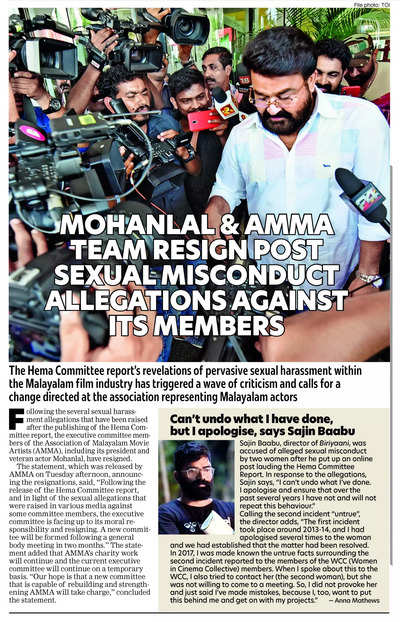- News
- entertainment
- events
- bangalore
- AMMA resignation: Malayalam film industry deserves better
Trending
AMMA resignation: Malayalam film industry deserves better
Agree? Disagree? Got a POV idea? Write to us at: [email protected]

At a time when all eyes are on the Malayalam film industry, which has been rocked by multiple sexual harassment allegations, and the findings of the Hema Committee report, the joint resignation of the executive committee members, of the Association of Malayalam Movie Artists (AMMA) spearheaded by veteran actor Mohanlal, seems rather poorly timed. What happens to the allegations of sexual harassment levelled by several women over the years, some as recent as last week?
 Consider this: It took over five years for the contents of the Justice K Hema Committee report to be made public.
Consider this: It took over five years for the contents of the Justice K Hema Committee report to be made public. The report, detailing widespread harassment and abuse of women professionals in the Malayalam film industry, has been unanimously hailed as a milestone in the fight against gender exploitation. Such was its impact, that the ripples were being felt in other parts of the country, where women voiced their support and gathered courage to tell their story too.
The report, detailing widespread harassment and abuse of women professionals in the Malayalam film industry, has been unanimously hailed as a milestone in the fight against gender exploitation. Such was its impact, that the ripples were being felt in other parts of the country, where women voiced their support and gathered courage to tell their story too.
The mass resignation of the very body that is meant to address and solve these issues and protect the rights of women to a safe workspace, is a major setback to the movement that was just gathering momentum.
The official statement from AMMA cites the various allegations made against some members by the Hema Committee as a reason for the dissolution of the body. “The executive committee is facing up to its moral responsibility and resigning,” reads the press note. It raises the question: Does moral responsibility begin and end with resignations? Does it not extend to ensuring justice to the victims who gathered the courage to speak up against the perpetrators and the enablers? The 16-member AMMA committee, which includes four female members, says a new committee will replace the one that has been disbanded, within two months, one “that is capable of rebuilding and strengthening AMMA”. There is no word on what happens to the cases that may come up in the interim, or the fate of the ones that are already under investigation. Two months, as we all know, is a lifetime in a woman’s fight for justice.


The mass resignation of the very body that is meant to address and solve these issues and protect the rights of women to a safe workspace, is a major setback to the movement that was just gathering momentum.
The official statement from AMMA cites the various allegations made against some members by the Hema Committee as a reason for the dissolution of the body. “The executive committee is facing up to its moral responsibility and resigning,” reads the press note. It raises the question: Does moral responsibility begin and end with resignations? Does it not extend to ensuring justice to the victims who gathered the courage to speak up against the perpetrators and the enablers? The 16-member AMMA committee, which includes four female members, says a new committee will replace the one that has been disbanded, within two months, one “that is capable of rebuilding and strengthening AMMA”. There is no word on what happens to the cases that may come up in the interim, or the fate of the ones that are already under investigation. Two months, as we all know, is a lifetime in a woman’s fight for justice.
Meanwhile, a few Malayalam actors have rallied around their female colleagues, demanding meaningful reforms and a safer workspace for everyone. What happens with the Hema Committee report and how the stalwarts in the industry and other stakeholders handle the situation, will also define how similar movements elsewhere in the country pan out. Conversations about making film industry bodies more inclusive by ensuring greater representation of women in leadership roles will also be crucial. As Malayalam actor Shammi Thilakan put it, “Now is the time... This industry should be passed on to the next generation in good condition, not in a deteriorated state.”
End of Article
FOLLOW US ON SOCIAL MEDIA








